REPORTING PROCESS OF ENTERTAINMENT NEWS ON TELEVISION IN THE AGE OF CONVERGENCE MEDIA TECHNOLOGY
Main Article Content
Abstract
The purposes of the research were to 1) To study the reporting process of entertainment news editors and its effects on the selection of news, the management of the styles of content and channels of communication, and the roles of entertainment news editors in the age of media convergence; and 2) To examine the reporting process of entertainment news reporters, sources of news, factors that facilitate the access to in-depth news, news reporting from the field, and qualifications of entertainment news reporters in the age of media convergence.
The data were collected from 4 entertainment news editors, 10 entertainment news reporters with over 10 years of experience, and 5 individuals in the entertainment industry (actors, actresses, and presenters). Such data were collected using an in-depth interview that comprised of goal-oriented conversations, along with a selected list of documents with an emphasis on the study of the styles and channels of communication of news through television and social media.
According to the results, it was evident that the entertainment news agency did not use social media merely as a means to extend the channels of communication from television broadcasting. Rather, entertainment news programs had been produced to be specifically broadcasted via an online channel, such as Line TV, Facebook, websites, and YouTube. Such transformation affected the reporting process of entertainment news in the age of media convergence. In particular, editors must correspond to the needs of the audience by presenting news that the society had an interest in at that point in time. Hence, editors were responsible for filtering the accuracy of information and developing a plan to ensure a variety of content styles under each news headline in order to be effectively broadcasted in both the original channel and social media. Alternatively, entertainment news reporters must possess a set of skills in the process of producing and presenting news. Each news reporter must be able to search for news, conduct interviews, capture images, edit videos, compile and write stories, and use communication devices to relay news to the public through all social media platforms.
Article Details
Academic articles, research articles, and book reviews in the Ph.D. in Social Sciences Journal are author’s opinions, and not the publisher’s, and is not the responsibility of the Ph.D. in Social Sciences Journal Philosophy Association, Ramkhamhaeng University. (In the case that research is done on human, the researcher has to be trained in Ethics for Doing Research on Human Training and has to produce the evidence of the training).
References
Apiromvijit, M. (2011). Factors influencing the exposure of audiences with entertainment news in Bangkok. Master's thesis, Thammasat University. [In Thai]
Bengtsson, M. (2016). How to plan and perform a qualitative study using content analysis. Retrieved December 31, 2017, from https://ac.els-cdn.com/S2352900816000029/1-s2.0-S2352900816000029-main.pdf?_tid=2995a50c-c3e7-11e7-9fba-00000aab0f01&acdnat=1510078506_e4d4771a7cdfefc60a7f19af0b4e4743
Britannica. (2017). Encyclopedia Britannica. Retrieved December 31, 2017, from https://www.britannica.com/topic/media-convergence
Chokhthwiphanich, R. (2007). The course teaches the principles of news media. Retrieved December 31, 2017, from https://elearning.nsru.ac.th/2550/report_beginning [In Thai]
Diderot, D. (2015). The encyclopedia of Diderot & D’Alembert. Retrieved December 31, 2017, from https://quod.lib.umich.edu/d/did/intro.html
Christopher, H. S. (2009). Encyclopedia of journalism. Thousand Oaks, CA: Sage.
Chuastapanasir, T. (2015). Multiplayer (multi skill) for people in the digital era. Retrieved December 31, 2017, from https://www.facebook.com/photo.php?fbid=10153311379128732&set=a.483861243731.261519.720008731&type=3&theater
Friedrichsen, M., & Kamalipour, Y. (2016). Digital transformation in journalism and news media: Media management, media convergence and globalization. Cham, Switzerland: Springer International.
Gershon, R. A. (2016). Media convergence. Retrieved December 31, 2017, from https://www.oxfordbibliographies.com/view/document/ obo-9780199756841/obo-9780199756841-0026.xml
Harper, R. A. (2010). The social media revolution: Exploring the impact on journalism and news media organizations. Retrieved December 31, 2017, from https://www.inquiriesjournal.com/articles/202/the-social-media-revolution-exploring-the-impact
Jetawattana, N. (2016). Thai people watch TV, add ‘digital channels’, divide the cake ‘audience - advertise’.
Jaturawan, W. (2013). News coverage on Alcohol Control Act B. E. 2551 in Thai newspapers. Master's thesis, Siam University. [In Thai]
Kipkirui, K. (2010). The future and prospects of online journalism in Kenya: A case study of the standard. Master's thesis. University of Nairobi, Kenya.
Komchadluek News. (2010). Sri Lankan polls indicate the most popular Thai entertainment news.
Napoli, P. M. (2011). Audience evolution: New technologies and the transformation of media audiences. New York: Columbia University Press.
Oluch, E.-O. (2016). Media convergence: A paradigm shift in journalism education in Nigeria. Review of Journalism & Mass Communication, 4(1), 19-42.
Phanomyong, A. (2017). LINE Thailand unveils the 2560 LINE application to “mobile portal.” Retrieved December 31, 2017, from https://www.forbesthailand.com/news-detail.php?did=1522 [In Thai]
Pornvasin, A., & SriSarakam, S. (2007). Adaptive strategies to converge media (news media). Case study nation network manager and dailynews. Bangkok: The National Research Council.
Oxford. (2016). What is happening to television news?. Retrieved December 31, 2017, from https://www.digitalnewsreport.org/publications/2016/what-is-happening-to-televisionnews/#references
Oxford. (2017). Oxford living dictionary. Retrieved December 31, 2017, from https://en.oxforddictionaries.com/definition/editor
Shoemaker, P., & Reese, S. (1996). Mediating the message: Theories of influence on massmedia content. New York: Longman.
Straubhaar, J., & LaRose, R. (2000). Media now: Communications media in the information Age. Retrieved December 31, 2017, from https://sawatdeeinthailand.wordpress.com
Srithanan, N. (2011). New media regulation in the convergnce era. Master's thesis, Bangkok University. [In Thai]
SriSarakam, S. (2011). The role of social Media and the changing of new reporting process. Master's thesis, Dhurakij Pundit University [In Thai]

